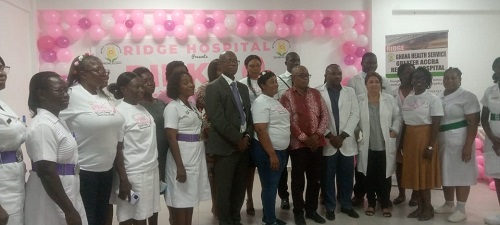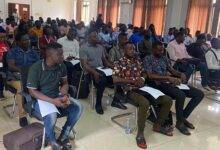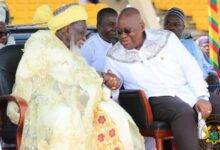
Unless an urgent action is taken, breast cancer will compound Ghana’s disease burden, increase poverty and gender inequality and reverse the current global gains against maternal and neonatal mortality, the Medical Director of the Greater Accra Regional Hospital, Dr Emmanuel Srofenyoh, has stated.
He was speaking at the lunch of Breast Cancer Awareness Month, by the hospital in Accra on Wednesday.
The launch was to intensify awareness of the disease and also encourage more women to conduct regular self-examination of their breasts for the early detection and treatment of breast cancer.
Dr Srofenyoh cautioned patients against the habit of reporting to hospital only when the disease had reached a critical stage.
“Most people come with advanced, often foul-smelling breasts to our hospitals and this needs to change,” she said.
Debunking misconceptions about the treatment offered at the hospital, Head of Clinical Services at the facility, Dr Ralph Armah, said chemotherapy and radiotherapy used in the treatment process did not poison the body, adding that the side effects were reversible.
According to him, it was also not true that an entire diseased breast would be cut off when a patient went for treatment, saying treatment depended on the stage the disease had reached.
“Early breast cancer is usually not painful and early breast cancer can be removed without removing the whole breast. Life may not go back to the normal you knew. Likely, you will find a new normal life which will bear the scars of treatment that you received, but also one that shows that you have reached the finished line.
“It is about time breast cancer was given the needed attention after COVID-19, as the number one killer of women,”and urged the media to join the crusade against breast cancer.
Dr Armah advised women to conduct self-breast examinations and report anomalies for early treatment, saying “you can survive breast cancer, it is not a curse, it is one of the non-communicable diseases.”
Ms Martina Amina Karimu, Senior Staff Nurse at the facility, asked women to visit medical centres if they noticed lump, swelling, redness and darkening, change in size, dimpling and nipple discharge in the breast, because early detection of breast cancer was important in saving lives.
“A lot is being done to fight the disease, and that some expensive drugs for the treatment of the disease had been put on the National Health Insurance Scheme.”
“We want to see the cancer early, detect it early, diagnose it early and treat it early and prevent other people from getting it,” he added.
BY BENEDICTA GYIMAAH FOLLEY







